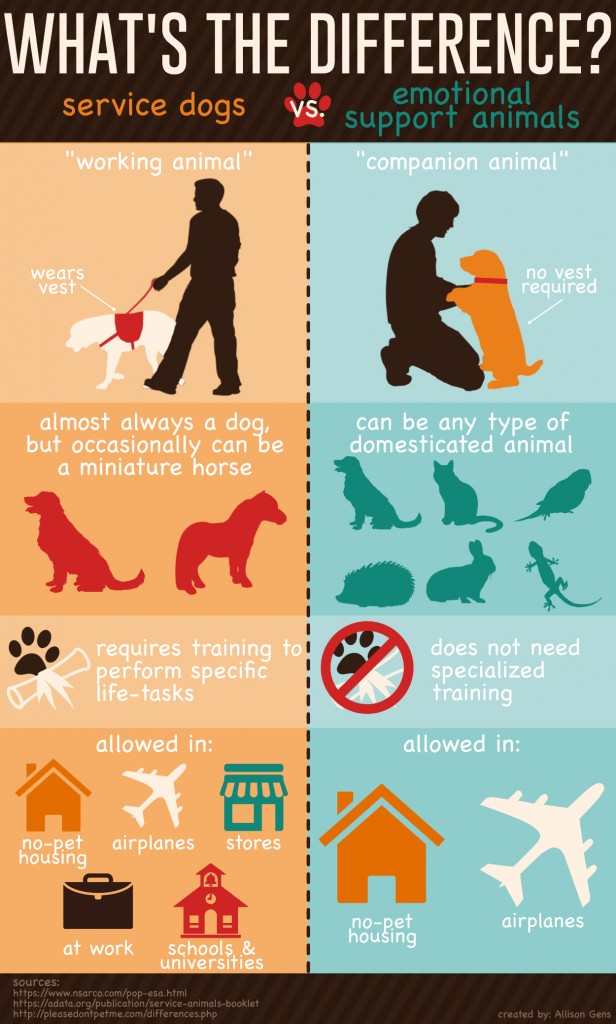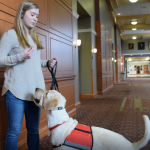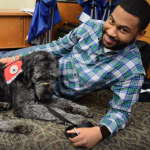
Dorm Room Doggies: Students Try To Get Pets On Campus
By: Allison Gens, Nicole SchneiderBy: Kaylee Bowers
Posted on:

Owning an animal on campus is not a walk in the park. Having an animal on campus, if you live in the residence halls, is against Ohio University policy. But that doesn’t mean students aren’t trying to get around this rule. One tactic is registering your pet as an Emotional Support Animal.
Emotional Support Animals, or ESA’s, are pets that have been prescribed by a doctor or mental health professional for an emotional or mental disability. The animal is part of the treatment, meant to bring comfort and minimize symptoms. While these animals are beneficial for those with anxiety, autism, PTSD and other mental disabilities and psychiatric disorders.
According to Carey Busch from Student Accessibility Services, there are currently 31 dogs registered as ESA’s for on-campus residents. Busch confirmed that this number has been substantially increasing over the past two years. In January 2016, there were only five registered ESA’s on campus.
For most of these 31 students, the ESA registration is vital.
Michaela’s Story

Michaela Sturgill is a freshman at Ohio University. Her dog, Panda, is her Emotional Support Animal. Sturgill went through the process of getting an Emotional Support Animal before purchasing Panda to live in the dorms with her.
“I came across the Emotional Support Animal certification website and I was like that sounds great, but I don’t think I can really afford to get a dog,” said Sturgill. “So I was like I’ll just go to Petland and play with puppies every now and then.”
Sturgill was almost finished with the process to get an Emotional Support Animal when she saw Panda at Petland.
“I went there and I found her and I was just like you know what, she’s my dog,” said Sturgill.
She was able to purchase Panda before all of the paperwork was finished for getting an Emotional Support Animal. Panda stayed at Petland until the process was completed. Once Sturgill had Panda registered, they were able to stay in the dorm together.
Getting an animal certified is a challenging process, and taking care of an animal in a dorm can be an even bigger task.
“It’s rough,” said Sturgill. “And after having her for about two weeks, I got an email that she needed to be out of the dorm within a few days because there were noise complaints.”
Sturgill moved to another dorm where quiet hours are not as strict and is enjoying Panda’s company in her new room.
“The best part about having her on campus is that it’s so much fun. I’m never sitting in my room bored with nothing to do,” said Sturgill.
Henry’s Story

Henry Pham, an Ohio University freshman, zips up his coat to conceal his puppy, Theodore, as he walks across campus.
“I was just looking around on Craigslist and I clicked on dogs and this little guy was on there,” Pham explained, “and I just had to have him, so I got him.”
But having Theodore has presented unexpected challenges for Pham, like losing a place to live as RA’s will not allow his dog inside the residence hall.
“I just slept over at my friends’ houses because I couldn’t keep him in the dorms. So that’s why I’m getting him registered as an Emotional Support Animal,” Pham said.
Henry Pham is currently going through the process to get Theodore registered as an ESA. This way, Theodore can accompany Pham anywhere on campus. To do this, Pham had to contact his doctor, requesting a letter stating he had a condition that would require an ESA.
“Even when I got that letter, there is another form that my doctor has to fill out,” Pham said. “If you know your family doctor pretty well and they are good to you, then no [it’s not hard]. I actually went up to Hudson and tried to get the letter from there and they told me to go away.”
Hudson Health Center is toughening their ESA registration process because so many students are attempting to register their pets without an appropriate diagnosis.
Maria’s Story

Unregistered animals in campus residence halls are not only making it more difficult for students to get ESAs, they are creating setbacks for service dogs on campus.
Maria Martin is the president of OU’s chapter of 4 Paws For Ability, an organization that raises, trains and places services dogs with children and veterans with disabilities. The role of OU’s chapter is to foster and socialize puppies four to five months old to get them acclimated to situations they might face during their time as service dogs.
“We are not officially trainers,” said Martin. “We are socializers, fosters, and volunteers.”
The problem Martin and her organization has run into is that since they are not trainers, the law is vague, which makes it difficult for OU to set rules on where the dogs can and cannot go.
“Service dogs in training are allowed everywhere a service dog would be allowed in public, but they’re with trainers, and since we’re not trainers, it’s a little bit tricky,” Martin said.
Martin said that her organization is working with the school to get rules set in place that would allow the dogs to go with them into the dorms and dining halls.
Robert’s Story

Since 4 Paws for Ability’s main goal is socialization, members of the organization spend a lot of time with the dogs, taking them everywhere.
Robert Spivey, a member of 4 Paws and “foster dad” of Peeves, said, “whether it be the bathroom, sporting events, showers, grocery runs, road trips, they are pretty much attached to us like they would be with a child or a veteran.”
This creates a close bond between the students and their dogs. After spending months with Peeves, Spivey struggled to say goodbye.
Spivey said, “I literally just started shedding tears as I was watching him walk away. He was just wagging his tail and had no care in the world. He thought he was just going for a regular check up.”
Peeves was returned to Spivey after his evaluation to see if he was ready to enter formal service dog training was a little rough. After a couple more months, Spivey hopes Peeves will finally be ready and then 4 Paws for Ability will get a new pup.
“Hopefully we can move on and get a new dog next semester but it just depends on how hard it is this time,” said Spivey.
Alternative Ways
If someone is not able to have their pet on campus, there are programs that provide alternative ways to interact with animals on and off campus.
During finals week, Alden Library brings in a therapy dog to help relieve the stress of finals for students.
On April 25th, Bullet, the therapy dog, will be on the fourth floor of Alden from 10am to 12pm. He will be there to meet friends for those needing a break from studying.
4 Paws For Ability has puppy play dates once a month, giving students the chance to play with the service dogs in-training staying on campus.
Another opportunity for students is to volunteer with the Athens County Humane Society. This gives students the chance to play and interact with animals without having them on campus.

